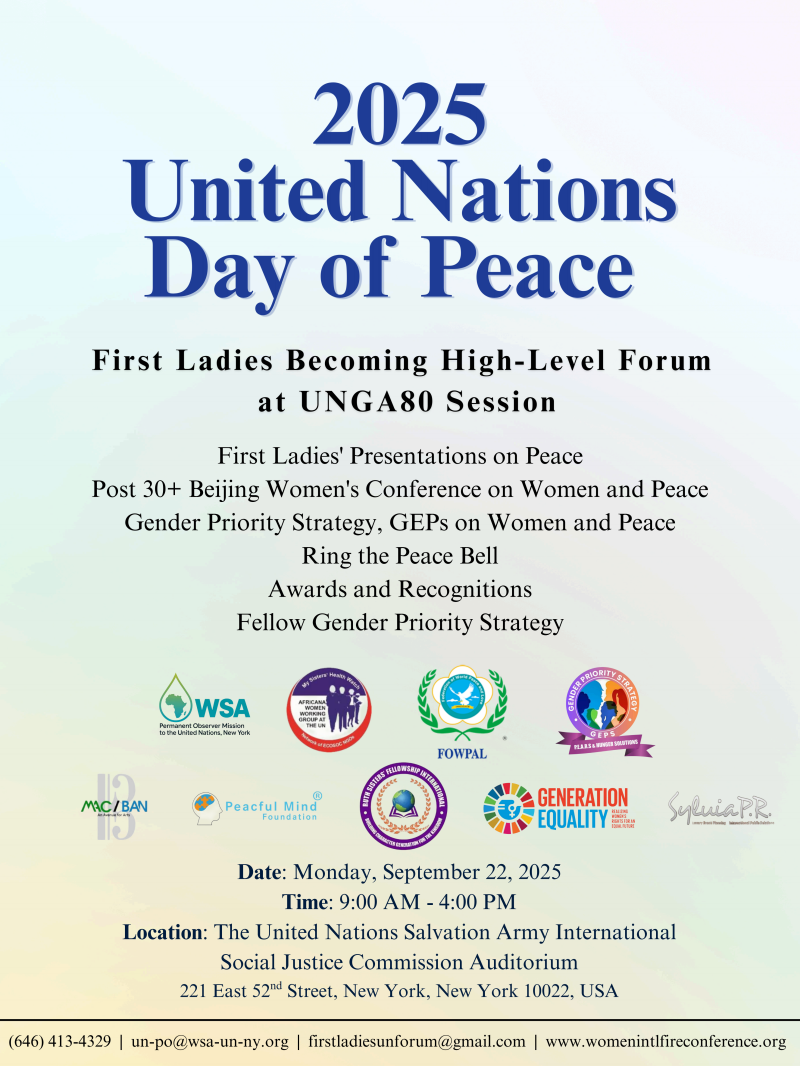
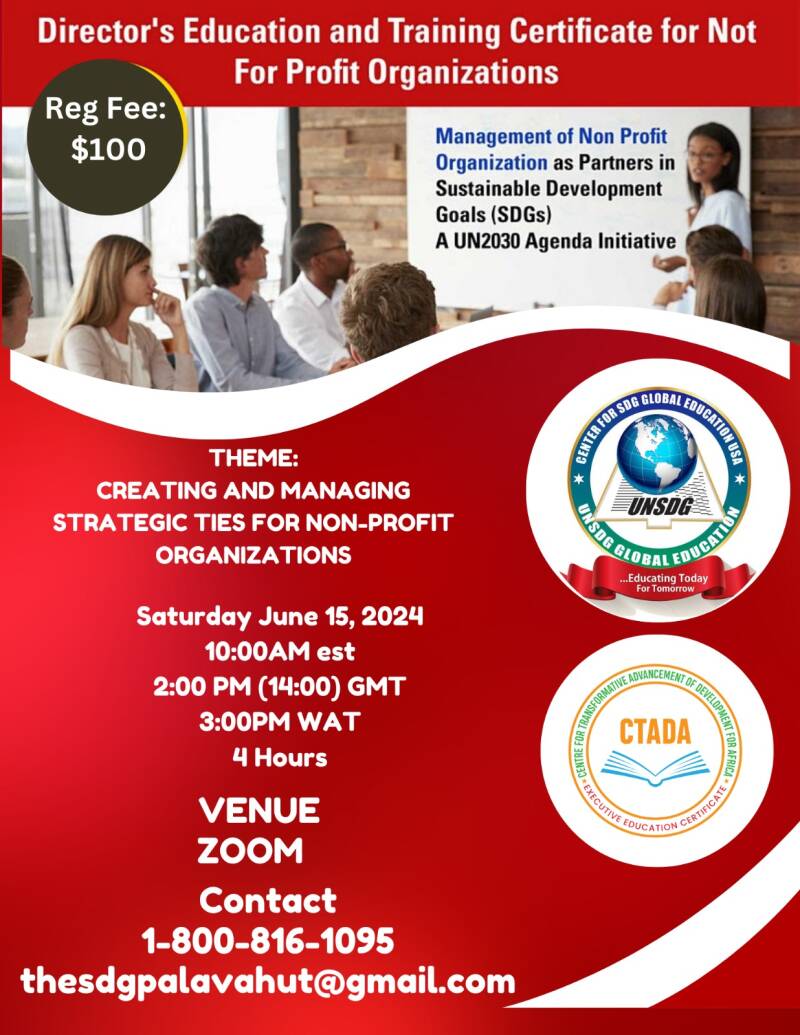

https://photos.app.goo.gl/spDAuE5baHABAa6T8
https://youtu.be/e9mOwlb72nU?si=Qq2iX-CGkdT-qwhR
https://smugmug.link/3sn8joXnUXX7tPPq7
https://smugmug.link/wYR6YxxptccgFBsaA
https://smugmug.link/id8v7QA5X222Pomh6
https://smugmug.link/FWmcWPTm2NBbeGZe6
https://smugmug.link/ZpsgBoVft81LhBrL8
https://smugmug.link/ZpsgBoVft81LhBrL8
https://smugmug.link/gRV52bEffeTKhPGh9
https://smugmug.link/gwjNPD3xWLnfwW39A


Program
Opening introduction, and welcome Prof. Ada JUNI Okika/ Dr Monica Sanchez
Special Guest Speaker (Expected): Generation Equality and Gender Ambition for Global Peace
UN Day of Peace: Action for Peace-Ambition for Global Peace-
Special Guest Speaker: Dr. Danny Glover, UNIICEF Humanitarian Ambassador
Dr. Hong, Tao-Tze, Vice President of the Association of World Citizens, NGO in Consultative Status with ECOSOC and Associated with the UN DPI/ President of the Federation of World Peace and Love
Special Guests Keynote Presentation: Gender Actions for Peace: Ambition for Women Leaders as Key Players on Global Peace. (First Ladies Presentation)
Session 11:
2023 UN Day of Peace Prayers, Peace Wish and Ringing of the Peace Bell
First Ladies
African Union Ambassador to the United States of America
New York City Speaker of the House
President of DEPOWA
Pastor Mrs. Folu Adeboye, Mommy GO, Redeemed Christian Church of God/Visionaire/Founder Africa Missions Global
Presentation and Signing Gender Priority Strategy, GPS Model on Gender Actions for Peace Banner
All First Ladies and Special Invitees (They will sign after ringing the Peace Bell
Reflection on World Peace: Song by
Session 111:
Review of Gender Actions on SDG 16 and Presentation of SDG Shadow Report
Mr. Musa Ibrahim, Executive Director, CISLAC, Nigeria
2023 UN Day of Peace Prayers, Peace Wish and Ringing of the Peace Bell
Partners and Special Invitees
Call to Action Speech: Special Guest
Prayers for Peace
Vote of Thanks and Closing Remarks
2023 UN Day of Peace Outcome
The outcome from the event will ignite action to further the GPS on Gender Actions for Peace by partnering with First Ladies in becoming pillars for sustainable world. Peace is possible in our lifetime by global citizens working in unity and harmony.
Since the establishment of the United Nations and the creation of the Charter of the United Nations, the member states have a responsibility to work towards achieving the agenda for 2020 of Leaving No one behind.
Life is better in a world where peace exists and, today, we look to those who have been peacemakers and peacekeepers to learn what we can each do individually to make the world a more peaceful place as well as advancing the Gender Priority Strategy as women.


https://youtu.be/JC5eGcXn-WM
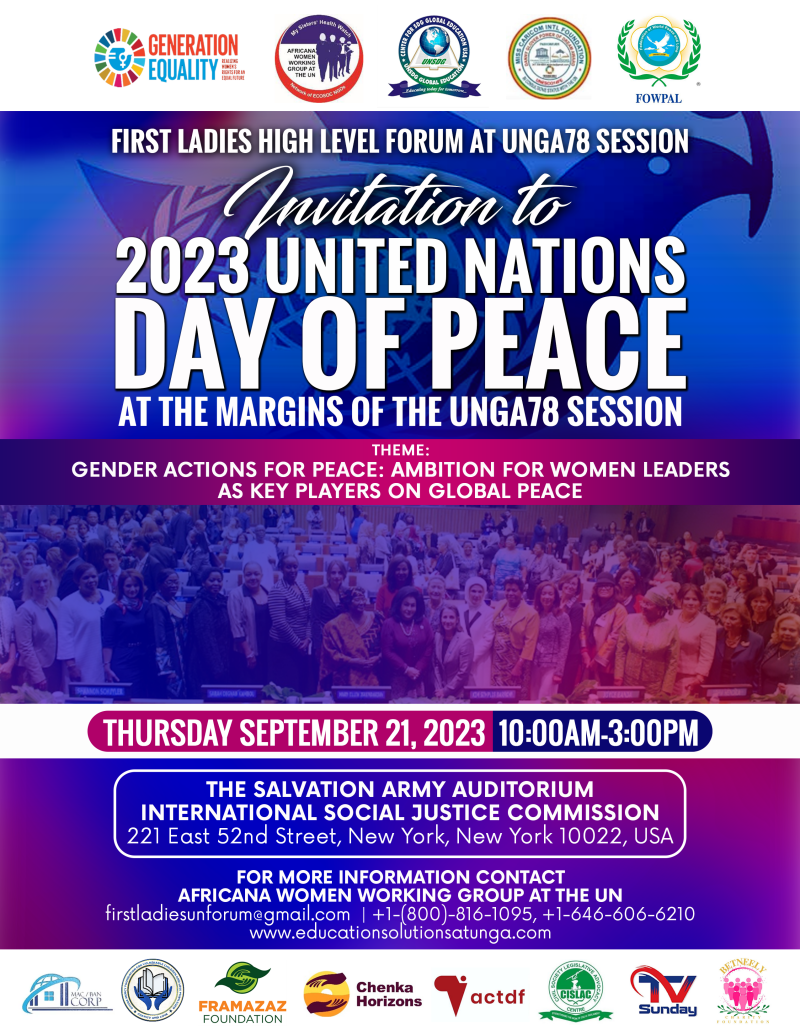
August 2023
Every year on September 21, the United Nations rekindles your passion for the global fight to bring peace and justice across the world during the annual gathering of the world leaders at the United Nations headquarters. The period remains the start of the UN general Assembly open debate. This year the event is scheduled for Thursday September 21, 2023 on the theme “Actions for Peace: Our Ambition for the #GlobalGoals” as a call to action to recognize our individual and collective responsibility to foster peace and contribute to the realization of and achieving the Sustainable Development Goals (SDGs).
The Africana Women Working Group at the UN, the coalition of NGOs in Special Consultative Status at the UN will hold its in person event to celebrate the 2023 International Day of Peace. Africana Women Working Group at the UN will explore strategies on how to advance the theme through discussion and conversation on “Gender Actions for Peace: Ambition for Women as Key Players on Global Peace”. As a gender advocate and promoter of sustainable peace, we request your participation at the event.
The outcome from the event will ignite action to further the GPS on Gender Actions for Peace by partnering with Africana Women Working Group at the UN in becoming pillars for peace in a sustainable world. Registration is $250 per participant. The registration fee is to take charge of program logistics, materials, and lunch.
Please accept our best wishes and assurance of our highest consideration.
Yours Sincerely,
Prof. Ada Okika Ph.D., FOIE, D-SPC, CDKA
UN Coordinator, Africana Women Working Group at the UN
Convener, 2023 UN Day of Peace

September 21 Each year allows opportunity for the global community to experience in depth concerns on the growing menace on peace and security across the world. Government, United Nations Community, Civil Society and Working Groups on peace, security and women, Faith Based organization commit to policies and resolutions that could harness the horrific conflict situations giving way to solutions expected to be fulfilled.
The theme for International Day for Peace 2022 is "End racism. Build peace." With the mission to work towards a world free of racism, racial discrimination and where compassion and empathy overcome suspicion and hatred.
In his pertinent concern, the UN Secretary-General António Guterres has said, "Racism continues to poison institutions, social structures, and everyday life in every society. It continues to be a driver of persistent inequality. And it continues to deny people their fundamental human rights. It destabilizes societies, undermines democracies, erodes the legitimacy of governments, and... the linkages between racism and gender inequality are unmistakable."
The drive however is to seek for lasting solution to various forms of conflicts, insecurity and achieve peaceful harmony for humanity. The global community has continued to call for solutions and strategies to achieving a peaceful society.
Africana Women Working Group at the UN, a network of NGOs in Special Consultative Status with Economic and Social Council at the UN and Miss CARICOM International Foundation Inc. has continued to utilize education through training and workshop to provide knowledge and resources that could help these organizations and office of Women in leadership and political positions to contribute to solutions that could bring peace to their community.
Through our First Ladies Women Becoming, issues relating to peace and security are given thoughtful process to building critical thinking faculty that will encourage the continued work on women peace and security across community.
This year, we are focused on the theme’ Model approach for Women on Global Peace and Security in Sustaining Peace” the theme will explore;
- Important model for women, young people, and civil society in approaching sustaining peace noting that in consistency of women’s engagement in peace processes, politics, governance, institution-building, rule of law, the security sector, and economic recovery, women need to be enriched adequately to work towards solutions.
- Gender-responsive capacityto include specialized skills to meet women urgent needs and expertise in rebuilding state institutions to make them more accessible to women and girls and less prone to gender based discrimination
The outcome is to develop an “Action Normative Framework as model approach for Women on Global Peace and Security in Sustaining Peace” resource for women organization on the 2022 International Peace Day theme for the protection of women and girls in communities.
Program Format:
9:00AM Tea and Coffee, meet and Greet
9:45AM Opening introduction and remarks
10:00 AM Education and Practical Training/Workshop: Significant Model for Women in approaching sustainable peace and security in communities (Instructor: A Caribbean Global peace Ambassador and Security Expert)
10:45AM: Conversation and Discussion 11:15AM: Snack Time
11:30 AM: Practical Workshop 12:15PM Lunch
12:45PM Education and Training 11: Gender Responsive Capacity on Specialized Skills and strategic Models (Instructor: US Institute for Peace)
1:45PM Conversation and Discussion
2:00 PM Tenets from: Gender Responsive Capacity on Specialized Skills and strategic Models
2:30PM Intervention Statement: Action Normative Framework Model approach for Women on Global Peace and Security in Sustaining Peace”
3:15PM Presentation of Certificates, Raising Voice in Solidarity to End racism. Build peace." and Group Photo.
3:30PM End of the Training



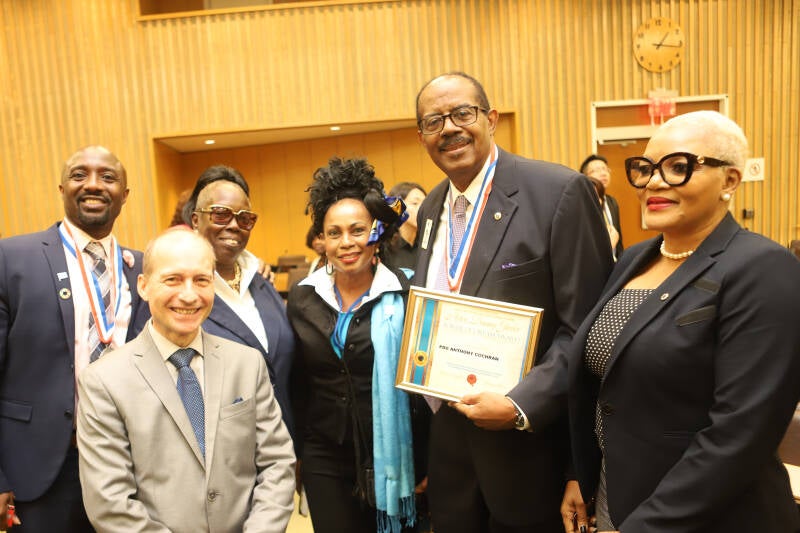
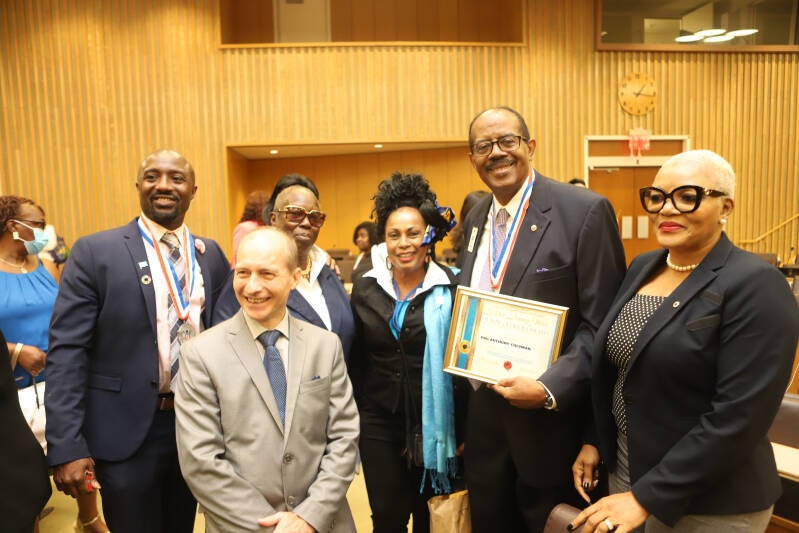






FRIDAY AUGUST 19,2022 EDUCATION SOLUTIONS SUMMIT:10:00am-2:00pm LEGACY LECTURES LAUNCH OF RURAL+ AND GALA: 6:00PM-10:00PM
CTADA USA 2022-EDUCATION SOLUTIONS FOR COMMUNITY CLASSROOM
The education system across the world has continued to be neglected, and almost run over since the COVID19 pandemic era. The impact of the pandemic on schools, universities, and other learning institutions, as well as the interruption of many literacies and lifelong learning programs, have affected the lives of more than 1.6 billion children and students across the world. The situation has also affected teaching career and profession making teachers unable to respond adequately to teaching and learning situations. Teaching, learning, and teachers’ conscience have been seriously affected too; with all these leading to a serious call for a rethink on how to restore and sustain quality and inclusive education for lifelong learning in community.
The Center for SDG Global Education USA, the Bar JUNI and Irene Menakaya Foundation Intl, MACBAN Arts and other partners aim to bring this call to a global discussion and international attention, through a day conference and gala dinner, titled “Think Tank for Rebranding Education in Community Classroom for the New Normal”, with a focus on the following themes:
- Community Education and Curriculum in Post COVID19 era
- Teachers’ conscience and the Decade of Action on SDG 4 and Targets
- Digital Education and Technology
- Infrastructure for quality education in community schools
- Funding for sustainable quality and inclusive community education
As the global community remains uncertain about the full prognosis of the COVID19 pandemic, the emerging challenge becomes how to produce quality and inclusive education, embracing cognitive, affective, and psychomotor learning in the growing trend of the New Normal in schools. And, increasingly, stakeholders in education across the world have continued to draw attention to the immense value of education in families and communities, in national development; and, in particular, in the United Nations Decade of Action.
Given the above, this conference is intended to serve as a wake-up call aimed at making global education systems more resilient to crises, and more inclusive, flexible, and sustainable to innovation, and to expansion of new frontiers and learning possibilities. The conference specifically aims to explore how teachers may bring willingness to ensure learning steadiness. The conference will also champion lifelong learning across community classroom to bridge the gap between teaching, learning and knowledge, thus accelerating the implementation of SDG-4 and Target's progress in community classrooms.
The Gala Dinner will bring stakeholders in education to recognition and to sharing forum on “Inclusive Solution for Sustainable Education in Community”. The shared forum will be supported with launch of RURAL+ and “My Child is My Pride” book signing.
Additionally, in furtherance of the goals of our Education Solutions initiative, the conference and the gala dinner recognition will strongly emphasize the use of digital technology in community schools without sacrificing the best of traditional pedagogy and culture. This is extremely critical as many students from developing countries still do not have access to mobile phones, tablets, and broadband. The event will thus privilege culture of the students and conscience of their teachers so that digital technology gradually becomes a part of them.
The outcome of this event will work to:
- Develop an integrative curriculum on Professional Development on Teachers’ Conscience
- Seek assistance of the UN Mission and other member states in gaining support of Government to prioritize education in community and to encourage teachers in rebranding teaching and learning for the development of humanity and teaching conscience
- Seek the support of the UN Mission to have a United Nations Observation Day on Community Education to drive the vehicle on quality, inclusive education for lifelong learning and teachers’ conscience in developing humanity
- Enact action on regional movement in providing education and training on Pillars of Learning Conscience and teachers for improvement of education in community classroom on SDG 4 and Targets
- Advocate to Community stakeholders on the outcome and declaration from the event
Indeed, time has come for a wake-up call – to make education systems more resilient to crises, and more inclusive, flexible, and sustainable to innovation, and to the expansion of new frontiers and learning possibilities in communities of developing nations.
This summit will explore how best the global community can team up to promote quality and inclusive education for lifelong learning and willingness to ensure sustainable learning steadiness in community classroom.
Program Structure
Session1: August19,2022 @ 10:00AM-2:00PM with support of Mission of Nigeria to the United Nations Venue: United Nations Conference Room
“Think Tank for Rebranding Education in Community Classroom for the New Normal”
- Reflection on SDG 4 from 2022 High Level Political Forum
- Community Education and Curriculum in Post COVID19 era
- Teachers’ conscience and the Decade of Action on SDG 4 and Targets
- Digital Education and Technology
- Infrastructure for quality education in community schools
- Funding for sustainable quality and inclusive community education
- Strategies on “Think Tank for Rebranding Education in Community Classroom for the New Normal”
- Roadmap for the Decade of Action on SDG 4 in Communities
Session 11: Education Solutions Gala and Launch of RURAL+
Theme: Inclusive Solution for Sustainable Education in Community
- Red Carpet Reception, Meet and Greet
- Declaration from the Summit
- Stakeholders Shared Conversation: Inclusive Solution for Sustainable Education in Community
- Launch of and Book Signing
- Dinner is Served
- Partners Remarks
- Roadmap for further action
- Closing




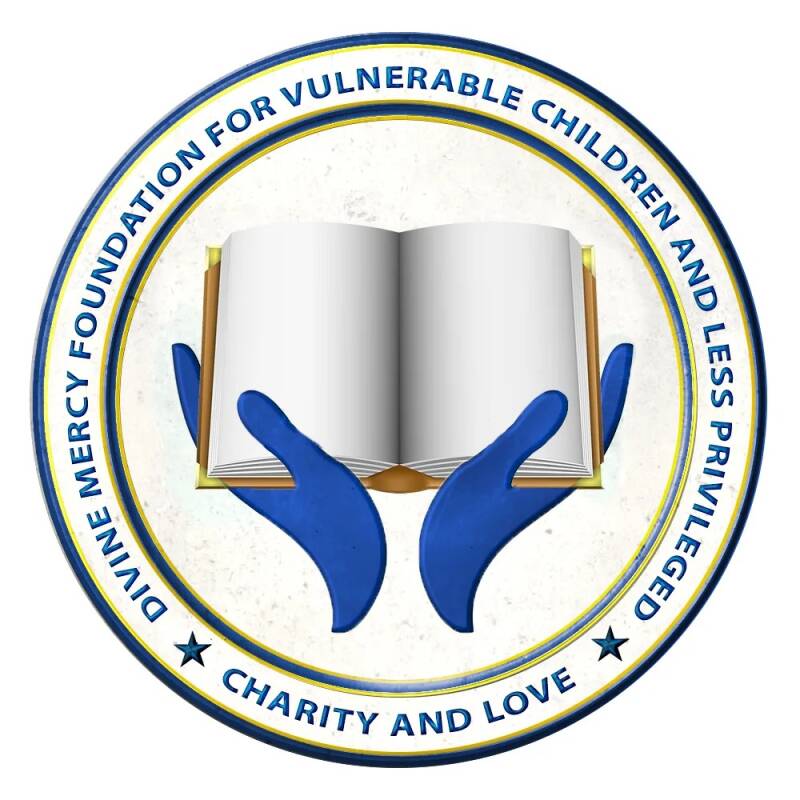


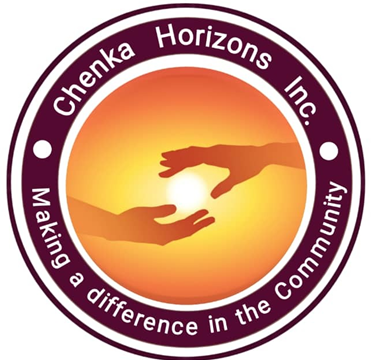
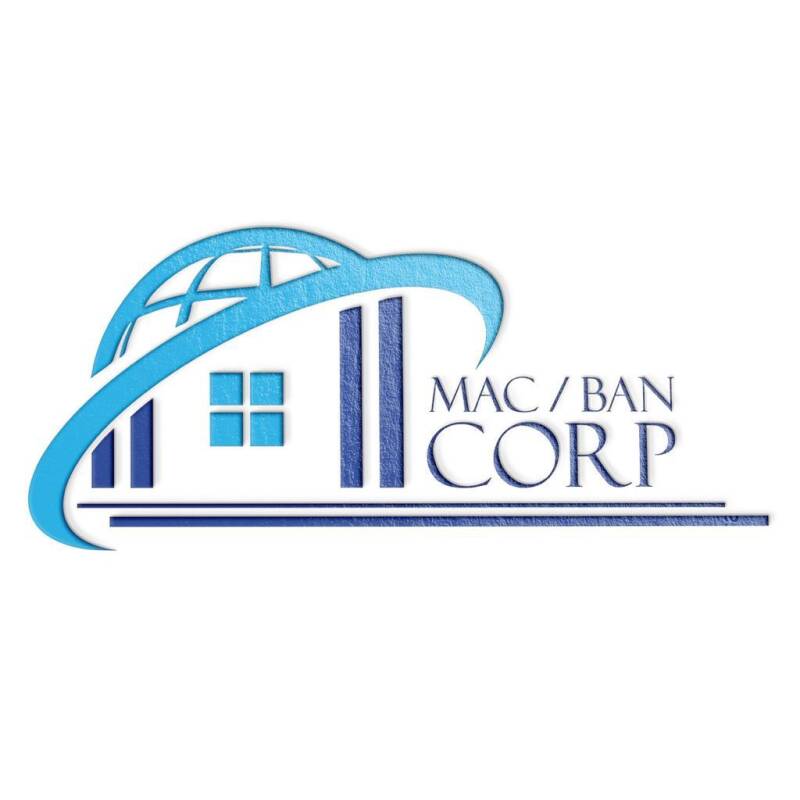


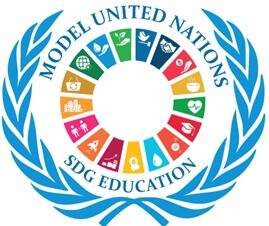


Underlying Concept
The Beijing Declaration and Platform for Action since its adoption continues to emphasizes women’s and girls’ overall health, and well being . Unfortunately more than 25 years since the BPfA was 1st adopted , there continues to be prevailing gender inequalities in spite of calls for gender-responsive policies and programs at all levels.
There is an urgent need for these calls to be translated in action which result in tangible outcomes in ensuring / improving e health status for women and girls locally and globally in order to meet the targets of SDG 3 set forth in the SDG agenda. .
With the onset of COVID19 pandemic, women and girls have been particularly affected. They have been subjected to increased violence either physically or mentally resulting in considerable increase trauma affecting the health and well being of women and girls globally. This became exacerbated during the ongoing COVID crisis, since early 2019.
As WHO defines health is a complete state of physical,mental and social well being . It is ironic that during the current challenge we are facing as a global community, the state of mind associated with mental illness has received considerably more attention than the gender specific determinants and mechanisms that promote and protect mental health and foster resilience to stress and adversity.
Side Event to Commemorate the CSW66-THEME: Strategies for Managing Women Wellbeing and Mental Health in Post COVID-19 Era
March 10-12,2022
The Africana Women Working Group at the UN in collaboration with the Ministry of Women, Children and Youth Affairs,NUMI Numidia Royal Council Kingdom propose to organize the above mentioned event commemorating the priority theme of the CSW66 Session “Achieving gender equality and the empowerment of all women and girls in the context of climate change, environmental and disaster risk reduction policies and program”.
The purpose of the event is to drive the Generation Equality Machinery Agenda to the women of indigenous citizenry in committing them to the Decade of Action and addressing women overall balance state of health especially in Post COVID19 era.
The objectives of the proposed event
- Recognize and strategize the effectively how community organizations and structures can support and promote mental health and wellbeing in women and girls
- Foster cross-cultural connections among diverse stakeholders to work at grass root levels.
- Address health of well and children using multi pronged approaches at local which can facilitate positive global outcomes .
- Promote the formulation and implementation of health policies that address women's needs and concerns from childhood to old age
- Identify and recognize Gender Life Initiative progenitors in support of health of women and girls
Program Strategies
- Presentations
- Round Table and Shared Conversation
- Plenary Sessions
- Breakout Sessions
- Workshop Session
- My Sisters’ Health Watch Conversation
- Dinner Award and Recognition
Conference/ workshop/ panel discussion in person
EDUCATION SOLUTIONS AT UNGA
EDUCATION SOLUTIONS AT UNGA76 SESSIONS:
THEME: Education Solutions for Community Classroom-UNGA76 Session Roundtable: Rebuild Quality, Inclusive Education and Revitalize Community Classroom in Post COVID19 Recovery
Saturday October 2,2021 11am
Hi there,
You are invited to a Zoom webinar.
When: Sep 30, 2021 11:00 AM Eastern Time (US and Canada)
Topic: EDUCATION SOLUTIONS AT UNGA76 SESSIONS
Please click the link below to join the webinar:
https://us02web.zoom.us/j/88651791893
Or One tap mobile :
Mexico: +525568269800,,88651791893# or +525586596001,,88651791893#
Or Telephone:
Dial(for higher quality, dial a number based on your current location):
Mexico: +52 556 826 9800 or +52 558 659 6001 or +52 558 659 6002 or +52 554 161 4288 or +52 554 169 6926
Webinar ID: 886 5179 1893
International numbers available: https://us02web.zoom.us/u/kchiB1EnMK
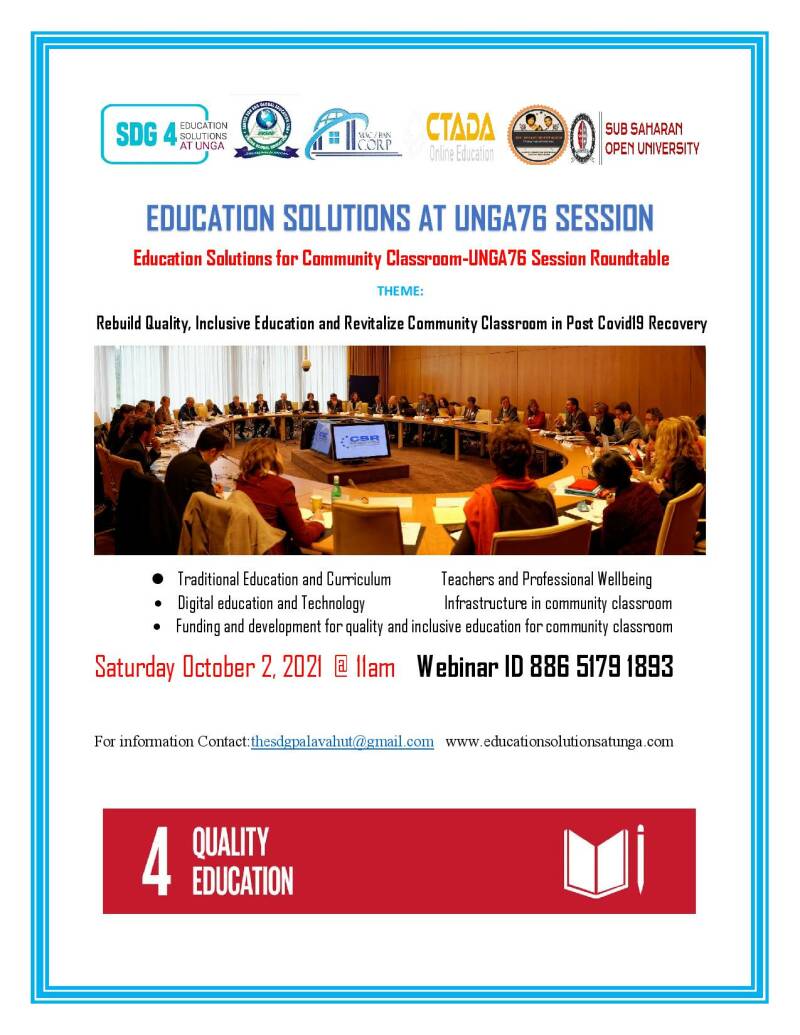





THEME: Rebuild Quality, Inclusive Education and Revitalize Community Classroom in Post COVID19 Recovery
Every year since the era of 2030 Development Agenda, the Center for SDG Global Education USA and its partners consider it most necessary to address challenges, gaps and enact global discussion towards building bridges for quality and inclusive education in community classroom.
Through its initiative, Education Solutions at UNGA, Center for SDG Global Education USA gathers distinguished stakeholders in education and in diversity to discuss pertinent issues around the SDG-4 and Targets in driving the Decade of Action on quality education in community. The outcome will propose a framework for action in committing to the vision of the United Nations Observance Day of Education.
This year, on this occasion of the 76th Session of the UN General Assembly, a virtual Education Solutions for Community Classroom-UNGA76 Session Roundtable Forum on Saturday October 2,2021 from 10:30am- 11am EST will discuss the theme “Rebuild Quality, Inclusive Education and Revitalize Community Classroom in Post Covid19 Recovery”. The objective is to raise expert ideas for further practical approach to a summit at the 2022 UN Day of Education.
The virtual Education Solutions for Community Classroom-UNGA76 Session Roundtable Forum is the leading event of our organization and partners, creating a platform for stakeholders and expert ideas to discuss the existing challenges encountered in community classroom and come up with innovative solutions, strategies, and recommendations to advance further theSDG-4 and Targets and sustainable development for the Decade of Action.
More actions are needed especially on quality and inclusive education for lifelong learning in community classroom to bridge the gap between teaching, learning and knowledge to accelerate the implementation of SDG-4 and Targets progress in community classroom. Education in Developed Nations have been thwarted by COVID19 pandemic devaluing education in community’s classroom. Education still represents the critical turning point for our overall development in the community and combating the COVID-19 Pandemic challenges has caused the international community to redefine education and solutions while considering the community situations for quality and inclusive education teaching and learning impediments.
From the outcome at the 2nd Bar JUNI and Irene Menakaya Legacy Lectures on the Theme “Global Learning Crisis-A Gap in Community Classroom”, the 2021 CTADA Global Forum, Education Solutions for Community Classroom-UNGA76 Session Roundtable Forum will uphold the views from the Stakeholders and Experts in Education to begin a practical approach to quality inclusive education for lifelong learning in community classroom.
Following a diligent consideration of outcomes from relevant sessions of 2021UN Day of Education, 2021 High Level Political Forum and 2021 2nd Barr JUNI and Irene Menakaya Legacy lectures, the Education Solutions at UNGA76 Session Roundtable Forum will address “Rebuild Quality, Inclusive Education and Revitalize Community Classroom in Post Covid19 Recovery” along;
- Traditional Education and Curriculum
- Teachers and Professional Wellbeing
- Digital education and Technology
- Infrastructure for quality education in community classroom
- Funding for sustainable quality and inclusive education
The outcome from the Forum will tend to outline bilateral strategies with respect to traditional education, pedagogy, digital education, improvement of learning and teaching environment and funding in responding to the rebuilding quality and inclusive education that will advocate on revitalizing community classroom teaching and learning for educators and students in an improved learning situation in Post COVID19.
DIGITGIRL CHILD

Program: 11:00 AM Est – 1:30PM Est Rapporteur: Prof Marie Umeh Prof of English, CUNY
11:05AM
Opening Introduction and Presentation: Dr. Ada JUNI Okika, Executive Director, Center for SDG Global Education USA/ Global Director, Centre for Transformative Advancement of Development for Africa, CTADA
Chair: H. E Ambassador Dr Denis Antoine, Former Vice President, UNGA69 Session
11:20AM: Traditional Education Curriculum
Discussants:
His Royal Majesty, Oba Hezekiah Adeniyi Owolola, the Adimula of Ifewara (OGOGO 11)
His Excellency, Ambassador Dr Lloyd Lucien Pinas, Former Ambassador of Suriname to China
With the emergence of the New Normal, education, teaching and learning is gradually adjusting to the use of modern technologies on grounds of modern curriculum. However, the traditional learning tools, and teaching methods seems to be going out of school system, yet the Development Agenda leaves a footprint on “Leaving No One Behind.” It seems therefore we have moved from the concrete traditional learning tools towards conventional digital learning.The action towards teaching and learning resources from our cultural background are needed to revitalize education in community environment especially in developing countries. At the Education Solutions at UNGA76 Sessions Forum, the expert discussion will harness the significant importance of traditional education, enshrine into quality and inclusive education especially in rebuilding quality, inclusive education and revitalize community classroom. The discussion will highlight traditional educational tools, traditional policies, rulership, and quality education in community.
11:50 AM: Teachers and Professional Wellbeing
Discussant:
Her Worship Sheran Palacio, Mayor, City of Belmopan, Belize
Jessica Kuo, Federation of World Peace and Love
To “Rebuild Quality, Inclusive Education and Revitalize Community Classroom in Post COVID19 Recovery requires the overall inclusion of teachers and teaching services. To achieve success, teachers’ welfare, development, and wellbeing must be made a priority especially if concerns on community education is considered a necessity to community development. Lack of adequate concern on teachers’ wellbeing and development will lead to low morale and career interest teaching and learning in community classroom in greater percentage.
Discussion on “Teachers and Professional Wellbeing, (pedagogy) is hoped to highlight; opportunities for teachers and educators to reconnect, heal, and feel safe and supported, offer ways for educators to assess their well-being and cultivate self-care strategies, provide educators with professional development that supports student teaching and learning ability, and connection. It will also recognize the knowledge interpersonal skills for communal harmony in learning environment within the community classroom.
12:20PM: Digital Education and Technology
Discussants:
Dr. Shivaji Sengupta, R������������������ VP Academic Affairs, Boricua College/ Professor of English
Engr Chuma Menakaya, Director, Outreach /UN Representative, Barr JUNI and Irene Menakaya Foundation Intl
With the entrance of COVID19 pandemic and the global lockdown and shutdown of school, halting education system across the world, experts went into critical thinking on “education next”. Teaching and learning through internet and computer technology became a New Normal on education.Education Solutions at UNGA76 Session seeks the role and future of education and skills in the digital world, identifying important digital skills needed for critical thinking of developing now and in the future. It explores how teaching and learning have access to education on digital skills, how we think about formal education and how our thinking needs to evolve with the increasing adoption of digital tools and technologies in teaching and learning world.The Education Solutions at UNGA will recommend a framework to ensure an inclusive education in an increasingly digital world and suggests roles for different stakeholders to ensure that this becomes a reality. Discussion will highlight role of digital education and technologies as an effective tool to make learning more adaptive and flexible in community classroom.
12:50PM: Education, Innovation, and Infrastructure for quality education in community classroom
Discussants:
Eng. Anke Weisheit, Co-Founder and Chair, Innovation & Business Management, Mbarara University of Science and Technology (MUST), Mbarara, Uganda
Prof Geoffrey Mahlomaholo, Research Professor of Education, University of Mpumalanga, SA
Rebuild Quality, Inclusive Education and Revitalize Community Classroom in Post COVID19 Recovery reflects on the relevance of teaching and learning infrastructure for quality education in community classroom.It also seeks to explore key issues such as access to safe and healthy school places, better spaces for learning, maximizing the benefits of pedagogy and the school-community relationship.
The session will further provide learning innovation that will enable mindset development and self-reflection, ask open-ended questions, create flexible learning environments, inform on personality matters towards creating a place for all learners, allow students take risks and fail, invite entrepreneurs and innovators into the classroom, and adopt the design-thinking of the mind to develop the intellectual learning skills.
1:20PM: Funding for Sustainable Quality and Inclusive Education
Discussant:
Prof Joe Omeokwe Professor, Mathematics Depart, Baruch College NY
Teaching and learning in community classroom recognize students who are hungry, can't see the blackboard, can’t provide for themselves necessary teaching and learning materials, face critical obstacles to learning in the classroom. Community classrooms education are such that cannot provide available resources to ensure adequate pedagogy and teachers wellbeing.Funding for sustainable quality and inclusive can lower barriers to learning, enable teachers’ incentives and wellbeing and help students succeed greatly. Through a coordinated approach, funding for community classroom seek to increase opportunities for community dwellers in developing countries through partnerships with funding organization and community-based organizations (CBOs) to offer a "whole child, whole community" approach, looking holistically at teachers, students, families, and communities to ascertain their most pressing needs and provide tailored supports and services.
1:30PM: Discussants One-Minute Contribution Outcome from Discussants and Closing Remarks by H. E Ambassador Denis Antoine
Conclusion
The outcome from this Forum will tend to produce objective, goals, and action steps on how we can move from concrete to propose action towards quality and inclusive education for lifelong learning in community. The Outcome will further commence an initiative to the mission of Nigeria to the United Nations to propose an action-oriented project that could step up global awareness on Leave No One Behind with respect to bridging the gaps on education in community classroom.
The outcome will further respond to the theme of the UNGA76 Sessions to “Rebuild Quality, Inclusive Education and Revitalize Community Classroom in Post COVID19 Recovery”.
Inputs to Strategic Action Plans to 2020 Education Solutions Classroom Academy Series:
Outcome of the COVID19 After Lockdown Preparedness-2020 Day of African Child organized by Africana Women Working Group at the United Nations New York and Center For SDG Global Education USA, June 16, 2020 through Zoom Conference
Preamble:
We the participants at the COVID19: After Lockdown Preparedness- 2020 Day of African Child would like to submit the following document on the event held on June 16,2020 through ZOOM, organized by Africana Women Working Group at the United Nations and the Center for SDG Global Education USA with the Africa Cultural Promotions Inc., Miss CARICOM Foundation Intl, CICA International University and Seminary, Sub Saharan Open University, Tomorrows Women Development Organization, MacBan Arts and Bar JUNI and Irene Menakaya Foundation Intl.
After summarizing the remarks and presentations made at the conference by distinguished scholars speakers and panelists including youth, children and representatives from the six regions of the world, participating organizations, practitioners and providers, senior diplomats, social workers, humanitarians and health experts, the following report was compiled reflecting on COVID19 pandemic, concerns on health, education and child friendly justice of African Child.
Background:
As governments around the world take urgent steps to save lives, protect livelihoods and plan to ease the lockdown on the COVID-19 pandemic, our organizations and partners have stepped up to this challenge by planning a free online conference ‘Education on COVID-19 After Lockdown Preparedness." The aim is to enact an action plan and set the scene for community health and wellbeing preparedness during and after COVID-19 Lock-Down.
The Education Solutions Classroom Academy (ESCA) Series has taken the vehicle of its action delivery to create content for community education, reduce emerging self-stigma, negative emotional health and to build healthy confidence in the minds of people while strengthening the education, economic and healthy wellbeing.
The Education Solutions Classroom Academy Series in furthering this initiative on the COVID19: After Lockdown Preparedness take to discussion on Education on COVID-19 After Lockdown Preparedness and 2020 Day of the African Child on the theme: “Education, Health and Access to Child Friendly Justice for African Child”,
The purpose is to highlight through discussions and expert presentations the:
- COVID19 and the African Child: Challenges and Issues
- COVID19 and Commemorating the Day of the African Child
- African Lessons and Understanding on the African Child
- Dignity of the African Child: the Perspective by African Children
- Position of the Global 2030 Agenda
- Call to Action for 2020 Day of the African Child
- Vehicle of Delivery for Education, Health and Access to Child friendly Justice of the African Child
The Zoom Conference joined the global community in commemorating the 2020 Day of the African Child, launch a digital re-engineering system as vehicle of delivery for a New Normal on quality, inclusive and sustainable education for African children at all levels of education. The conference further responded to COVID19 issues hinging on the Rights and Welfare of the African child and has come up with outcomes on child based approach that explains Rights of the African child in realizing a Child Friendly Justice system for all African children.
Impact
COVID-19 is not only challenging global health systems but testing our common humanity. It affects everyone everywhere, including children of Africa and African Communities yet it hits the poorest and most vulnerable communities the hardest, deepening existing inequalities. Social, political and economic inequalities are amplifying the impacts of the pandemic.
The global community needs to be reminded that human health is a state of complete physical, mental and social wellbeing and not merely the absence of disease or infirmity in all matters and relevant at all levels. Further still, the integrative wellbeing of African Children in situations of COVID19 and other pandemic calls for the need to ensure that existing mechanisms embrace the best interest of the child and their right to education, good health, social and wellbeing, their right to live, survive and develop their inherent traits and build a sustainable future,
The recognition of the global lockdown across nations and the United Nations member States, the closure of the diplomatic administrative Headquarters, the clarion call of Country Presidents to national health safety, the committed efforts to produce acceptable vaccine and medication, the integrative effort of the global community to ensure safety of world people, the continued effort of the WHO to ensure application of universal standard on healthy humanity and the decision to convene Education Solution Classroom Academy Series on COVID 19: After Lock Down Preparedness-Day of the African Child focusing on Education, Health and Access to Child Friendly Justice of the African Child”, reiterates the African regional and global commitment to rethink about the future and advance new modes of transformation and sustainability of the future of the African Child that can impact global connectivity in combating disparity.
The Education Solutions Classroom Academy Series 11
The Education Solution Classroom Academy Series 11 is timely and crucial as it has laid the foundation to create a roadmap on right to quality and Inclusive education, sustainable health and wellbeing and child friendly justice of the African child during and after COVID-19 Lock-Down.
In addition, as governments around the world take urgent action to save lives, protect livelihoods from the COVID-19 pandemic, and plan to ease the Lock Down, our organizations and partners have stepped up to this challenge by holding the Education Solutions Classroom Academy Series 11 to join the global community to commemorate the 2020 Day of the African Child and discuss the forward action in favor of the African child in times of emerging pandemic. The purpose is to highlight through discussions and expert presentations the:
- COVID19 and the African Child: Challenges and Issues
- COVID19 and Commemorating the Day of African Child
- African Lessons and Understanding on African Child
- Dignity of African Child: the Perspective by African Children
- Position of the Global 2030 Agenda
- Call to Action for 2020 Day of African Child
- Vehicle of Delivery for Education, Health and Access to Child friendly Justice for African Child
The zoom conference in addition to the commemoration of the Day of the African Child launched a digital re-engineering system as vehicle of delivery for a New Normal on quality, inclusive and sustainable education for African children at all levels of education. The conference further responded to COVID19 issues hinging on the Rights and Welfare of the African child and has come up with expected outcomes on child based approach that explains Rights of the African child in realizing a Child Friendly Justice system for all African children of this program is to create content for community education, reduce emerging self-stigma, negative emotional health to build healthy confidence in the minds of people while strengthening economic and human healthy living.
Inputs to Strategic Action Plans.
Introduction
Inputs to Strategic Action Plans to Education Solutions Classroom Academy Series 11 on COVID-19: After Lock-Down Preparedness have scope that impinges on the overall concerns of the African Child from global to national to local and community levels. The conference acknowledged the message received from the office of the Deputy Secretary General of the United Nations, Ms Amina Mohammed “As the world faces the unprecedented challenges posed by the COVID-19 pandemic during this Decade of Action in achieving the goals of the 2030 Agenda for Sustainable Development, it is important to recognize children and young people as positive change agents – the leaders of tomorrow.’’
Education remains a key area of focus. Together, we must ensure that the African Child is equipped with the necessary tools and knowledge to secure a healthy planet and a better world for all, leaving no one behind”.
Strategic Action Plans to be considered on COVID19 and the African Child: Challenges and Issues:
- shifting focus towards a child’s empowered life
- leadership values program focusing on community and nation transformation
- need on global perspective on education of the African Child
- Reaffirmed COVID19 consequences and concerns on the African Child
- Noted on the adverse effect on social economic and humanitarian crisis
- Considered the adverse effect on education of children in Africa
- Called on the need to tackle issues hindering African children from reaching their inherent potentials
- African Union to consider the social determinants of health and need to adjust to new style of teaching and learning
- Concerns on how to adjust to the holistic system of education in Africa
- Concerns about adolescent children of Africa
- Adopting holistic System of education including food and nutrition, providing the African child the opportunity to stand up for himself and have the necessary tool to face their future
Strategic Action Plans to be considered on COVID19 and Commemorating the Day of African Child
- Affirmed the physical, psychological, intellectual and social impact as well as risk on health of children and effect on their cultural, social and environmental well being
- Noted the need on continuous education about COVID19 with emphasis on symptoms, good nutrition, heath checks and testing, social and physical distancing and use of protective measures
- Recalled that the Day of the African Child was established by the Assembly of Heads of State and Government of the then OAU in memory of 16 June 1976 students uprising in Soweto South African when students were experiencing poor quality of education received leading to their demand that their education be taught in own language
- Noted that the day of the African Child serves to commemorate the pains and cries of these children and their brave action taken in defense of their rights thereby calling for committed reflection and obligation towards addressing the numerous challenges facing the African child from developing their inherent potentials for their sustainable future
- Considered the theme of the 2020 Day of the African Child “ Access to Child Friendly Justice in Africa” as obtained from the African Committee of Experts on the Rights and Welfare of the Child Committee established in accordance with Article 32 And 33 of the African Charter on the Rights and Welfare of the Child
- Noted the significant need to address the education, health and access to child friendly justice for the African Child and the impact of COVID19 on the future of the African and Africana children
- Noted the need for inclusive support to all children including orphan children, children in vulnerable situations, gifted and exceptional children in situations of health and social pandemic
- Noted the need to utilize media , child advocacy , provision of equal opportunity to all children and inclusion of voices of children in policies that concern them in Africa
Strategic Action Plans to be considered on African Lessons and Understanding of the African Child
- Considered thought process from governments,mission, private school and educators perspective understanding on Africa lessons with respect to situation of the African child in times of COVID19 pandemic
- Noted the concerns by governments on the abnormality of millions of children out of school since March 2020
- Affirmed the catastrophic menace of the COVID19 pandemic on the future of the children of Africa and effect on the growth and development and the future of Africa
- Outcry on the increase in physical abuse of children and vulnerability to sexual abuse and Female Genital Mutilation
- Noted children in rural communities have no access to digital tools and online/remote learning
- Called for continuous discussion, collaboration and assessment on needs of children in Africa
- Need to review the National curriculum, improve on stem education and have more practical subjects in place to meet with the challenges of the “New Normal” on education of the African Child
- Significant need for action on nutrition, psychomotor and effective education to meet with the education challenges of the “New Normal”
- Affirmed that the transformative vision of SDG to be linked to Pan African vision of a united and prosperous Africa
Strategic Action Plans to be considered on Dignity of the African Child: the Perspective by African Children
- Noted the effect of COVID19 on health of African children
- Noted the closure of schools due to COVID ’19 necessitating use of online education and the existing challenges
- Considered views of African children in matters affecting them to be held in high esteem in the future we want for Africa
- Called for the need to work cooperatively and collaboratively to set realistic priorities and investments with concise implementation plans that include PROGRESSIVE short- and long-term goals with respect to the needs of the African Child
- Affirmed that the framework of action must reflect the regional and local context, including cultural diversity, resources and level of stability
- Considered significant need to improve and advocate for access to child friendly justice system in Africa utilizing the service of Civil Society organizations
- Noted that critical role in ensuring child rights education and legal awareness for all children, as well as for families and communities; through child participation projects; supporting community-based legal services; legal aid clinics, and socio-legal defense centers should provide legal information, inclusive participation of sector players and continuous representation to children
- Outcry on impending danger of COVID19 on African Children and emphasized on the need to begin with better data about COVID19 infection and effects on children
- Noted the positive effect of COVID19 pandemic quarantine on children leading them to being more independent and resourceful in exploring their future
- Noted the “New Normal” have provided African children in the Diaspora with flexible timetable, better quality work. Created opportunity for them to learn new skills through research, reading, creativity and Increased Independence
- Noted the negative effects f the COVID19 Quarantine affecting the mental and social wellbeing of African child
- Admired through socializing how COVID19 has created innovation for children to continue through their social affairs by the use of technology to socialize, encouraging weekly chat on Teams with our teachers, checking up on friends, classmates, and relations and enjoying birthdays virtually
- Appreciated numerous changes in the lifestyle of children across the world due to COVID-19, admired different lifestyle and need for Importance of good education for all children during COVID19 pandemic
Strategic Action Plans to be considered on Position of the Global 2030 Agenda
- Affirmed the need for inclusive education for the African Child through Model United Nations
- Noted the relevance to global education in encouraging the African Child education through exchange education programs
- Advocated for quality education for a sustainable life
- Called for the need to train and educate African children on diplomatic skills, negotiations skills, solution-oriented, critical analysis, leadership skills, time management, teamwork, lobbying, writing skills, communication skills, debating skills, intellectual skills, presentation skills, quick decision making, drawing: policies, constitutions, frameworks and guiding laws and principles
- Addressed the pathway to hope and the transformative power of early childhood development
- Noted that migrant and refugee children cannot be forgotten during the pandemic
- Noted that the early years of a child’s life are critical for building the brain’s foundation
- Recalled that science is clear and a child’s brain constantly grows in complexity and is greatly impacted by daily experiences;
- Recalled that adversities and toxic stress in the first few years affect children throughout their lives;
- Noted that the COVID19 and other pandemic has long- term effects on cognition, health, wellbeing and productivity and also contributes to the cycle of poverty, inequality, and social exclusion affecting societies across the world
Strategic Action Plans to be considered on Roadmap on Right to Quality and Inclusive education for African Child: African Union Agenda 2063
- Noted the common challenges for the educational sector in African countries including teachers and shortage of qualified teachers reduce the class size and reduce the overcrowded classrooms
- Noted that the instructional material such as the scarcity of quality teaching and learning materials in the classroom as serious impediment to educational effectiveness in most African countries
- Pointed on the significant need on national language or mother tongue in teaching rather than teaching in a secondlanguage
- Noted the significant need to put incentive for teachers into consideration but affirms the use of monetary incentives to increase teacher morale remains a major challenge for many countries.
Strategic Action Plans to be considered on Vehicle of Delivery for Education, Health and Access to Child Friendly Justice for the African Child
- Recalled the efforts of the African leaders on addressing the concerns of African Children
- Noted the significant priority on women, children. Adolescent and the vulnerable population
- Addressed the disparity, inequality and injustice experienced by African Children in communities of Africa
- Affirmed the need for action oriented programs to help overall understanding on COVID19
- Called for need of development opportunity to stand up on justice system in position impact on African Children
- Called forthe extreme eradication of poverty, poor nutrition, denial of education , health and wellbeing on African children
- Call for urgent need on quality and inclusive education for lifelong learning on African children
- Launched the RURAL+a Digital Education System for A New Normal on Education of African Children
- Admonished that our Education Solutions Classroom Academy (ESCA) Series has taken the vehicle of its action delivery to create content for community education, reduce emerging self-stigma, negative emotional health and to build healthy confidence in the minds of people while strengthening the education, economic and healthy wellbeing
- Called on the need to get back education at all levels on track from global to local communities in developing countries.
Education Solution Classroom Academy Series 11 Outcome:
The Education Solutions Classroom Academy Series 11 on COVID19 and 2020 Day of the African Child digressed issues affecting the African Child most importantly on health, education and access to justice system especially during COVID19 and other pandemic. To further address the concerns through:
- COVID19 and the African Child: Challenges and Issues
- COVID19 and Commemorating the Day of the African Child
- African Lessons and Understanding of the African Child
- Dignity of African Child: the Perspective by African Children
- Position of the Global 2030 Agenda
- Call to Action for 2020 Day of the African Child
- Vehicle of Delivery for Education, Health and Access to Child friendly Justice for the African Child
The speakers from the world six regions and the two hundred and eight registered participants envisaged that proactive measures are most needed during the present COVID19 era to improve of the existing menace of COVID19 on overall concerns of African Children.
- The excellent and expert presentation of speakers including input from African children from Africa and the Diaspora and the launch of the RURAL+further responded to COVID19 issues hinging on the rights and welfare of the African child with expected outcome on child based approach in realizing an education, health and child friendly justice system for all African children.
- Urgent need is necessary for improvement and compulsory education and conducive environment for all children
- During and after lockdown on any pandemic, the African children must be provided with opportunity and tool to enable them fulfill their inherent potentials
- Teachers and educators should be provided with incentives and other motivation indicators to enable them adequate professional services to the development of the African Child
- Need to establish Confederation of African Proprietors of Private School Association to exchange score card and chare challenges to solution, establish inter relationship to have children learn from one another across Africa, expand the scope and knowledge growth on African children through excursion and visitation within Africa
- Expand the RURAL+digital education system and expedite action to establish the device to meet with the challenges of the education of African children at all level of education in the “New Normal”.
- Plan a follow up Zoom conference on “DIGITALIZING EDUCATION IN AFRICA” with professional experts and work towards re-imaging the education process to achieving quality and inclusive education for lifelong learning.

